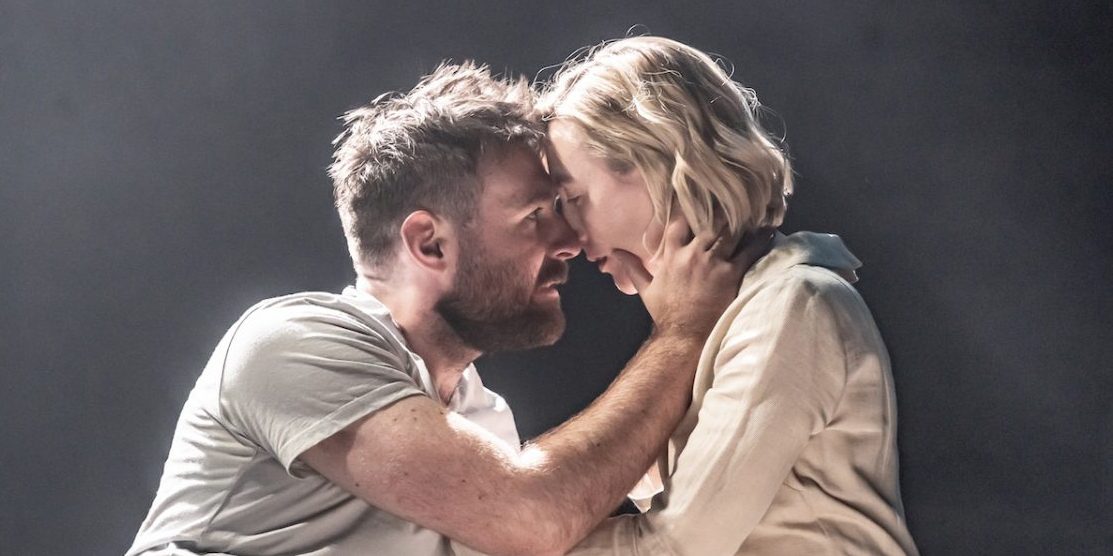‘Macbeth’ is Shakespeare’s shortest play purely as text and productions often rush past the audience in a blur of whisper and furtive conspiracy, even without an interval. Not in this case. The evening last over 3 hours and proceeds at a measured pace with the director’s signature attention to detail and memorable painterly tableaus evident in every scene. Yaël Farber’s imprint is self-evident with recurrent motifs and gestures planted early on and gaining growing resonance throughout the evening. Enormous care and thought have gone into every aspect yielding important but mixed results overall.
The first half has many memorable moments but never quite catches fire or gathers pace sufficiently around the murder of Duncan. But the second half, here running from the banqueting scene to the conclusion is as finely rendered an arc of compelling drama as you will see this year in any theatre. While coolness and circumspection dominate in the opening acts, after the interval extraordinary levels of tension, pain and energy are released in all the players that hushes the audience into rapt concentration. What can be a procession of predictable short scenes as we move towards the denouement becomes here a tightly drawn sequence of perfect character sketches. Relatively minor characters, such as Macduff and his wife, and Malcolm acquire new presence and significance in the action, partly through the skill and intensity of the acting, but above all through a simple but wholly convincing change to the text in one place that suddenly gives new coherence and meaning to the whole.
In the title role James McCardle has a huge macho presence and surpassing energy but is also capable of a rare emotional sensitivity when needed. He is at his best in playing it simple and straightforward – when he breaks up the line of the famous soliloquies with hesitations so as to make them seem more like natural improvised speech, he does himself and the verse no service. But this is a rare blemish. He seemed quite drained at the end, as well he might be. Equally compelling is Saoirse Ronan’s portrayal of his wife. She begins in low-key hauteur, with as much disdain as dynamism; but in the second act her disintegration is utterly convincing and very moving.
Casting elsewhere is uniformly fine. Ross Anderson and Emun Elliott as Banquo and Macduff trace plausible development in their characters and finish as a particularly bloodied ghost and grief-hardened widower respectively. William Gaunt plays a Duncan full of frailties trying to relive his glory days of chivalry, and Michael Abubakar finds unusual purpose and presence as his son Malcolm, an essentially ungrateful role. The truly revelatory performance is that of Akiya Henry as Lady Macduff. She embodies a dignity, pain and humour in this small role that raises everyone else’s game and ensures that her murder and that of her children is the most shocking of the play. Her wonderful voice is also heard at points keening in a generalised lamentation that darkens the later stages of the action still further.
There are some minor alterations to the text, mostly for the better. The tiresome Porter’s scene is fortunately cut as is most of the laboured hocus-pocus attributed to the ‘weird sisters.’ who are here more of a wry chorus of sharp-suited management consultants than horrid hags.
Lighting and staging are subdued. The set by Soutra Gilmour is minimalist and flexible with an unusual array of features, including a standpipe which gets a lot of use so that eventually the whole stage, and I suspect the front seats in the stalls, are awash by the end. Costumes are essentially modern dress, with touches of retro elegance and pagan animal insignia. The soundtrack manages both to impress and to irritate. The device of a solo cellist, also playing a lady in waiting, works well; but the continual underscore even in the most memorable sections of the text detracts from the already complete music of the verse.
While there are grounds for criticism, reflected in the four rather than five-star rating, this is a hugely impressive undertaking in the quality of its playing; and the fearless willingness to embrace uncompromising but appropriate interpretations of one of Shakespeare’s most familiar plays deserves the highest praise.

